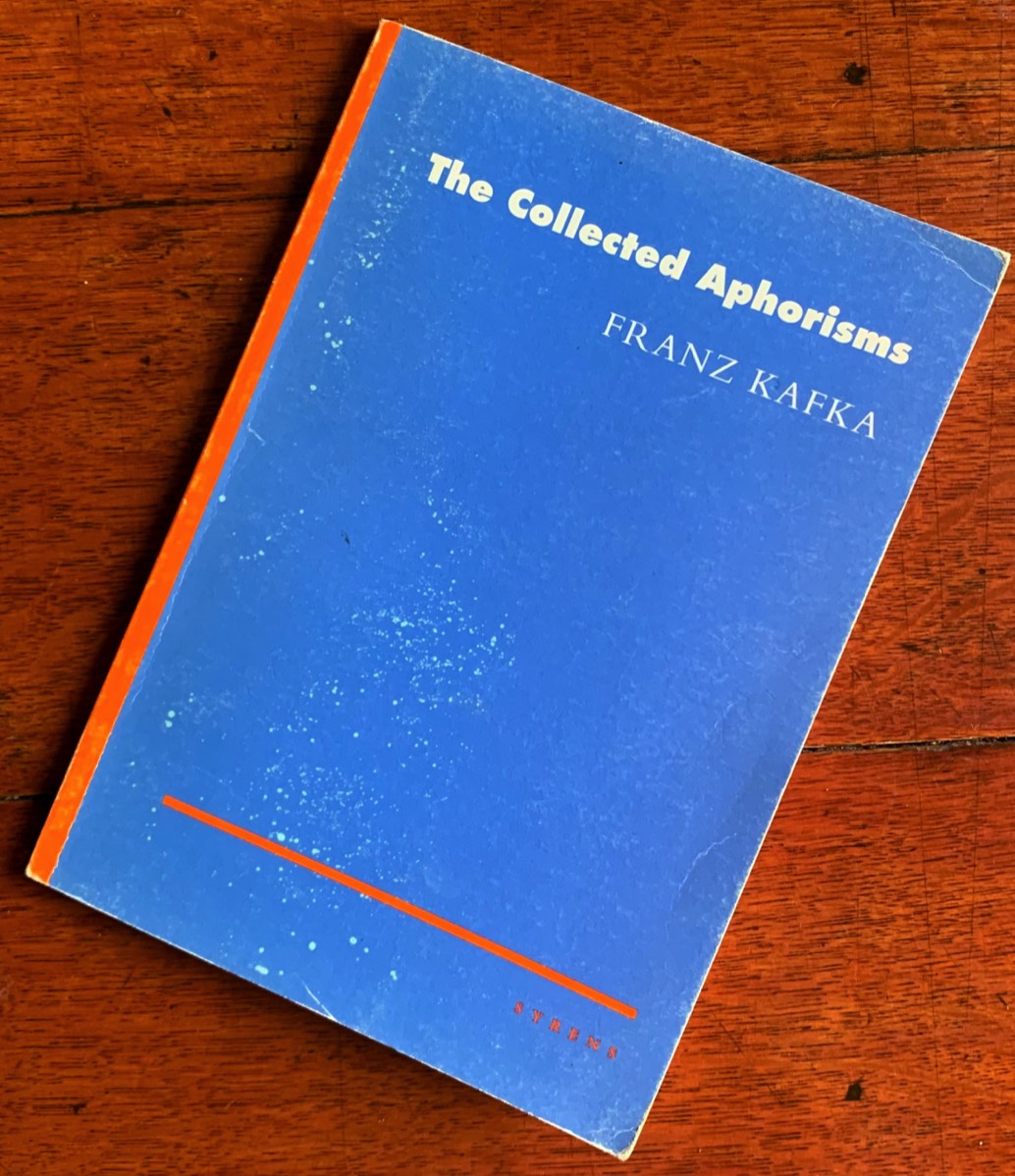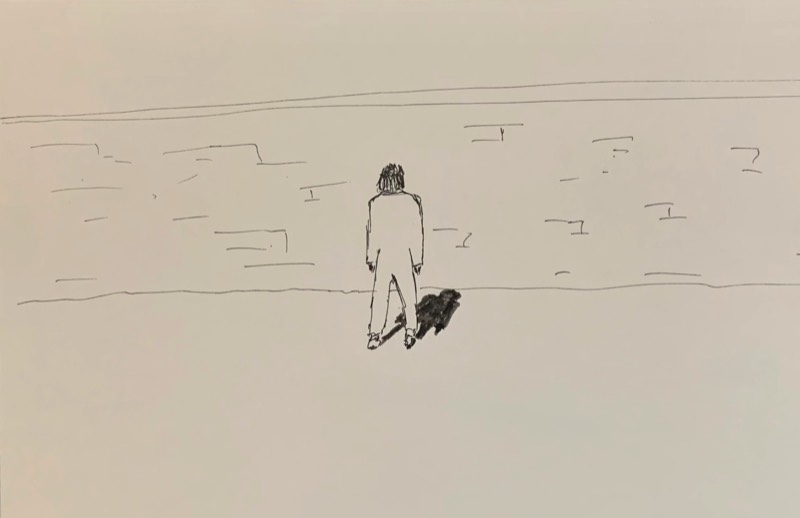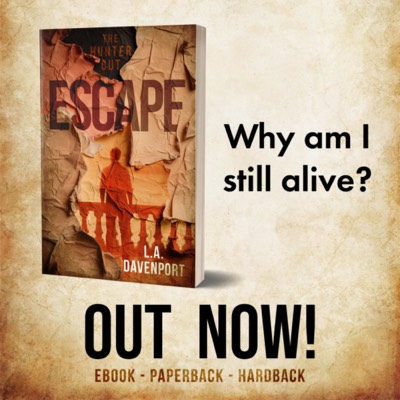Kafka and the Universal I
Writing, 8 June 2024
by L.A. Davenport
It is just over 100 years since Franz Kafka died, and apparently he is finding a new life on TikTok, once the scourge of modern life and now, we are led to believe, the saviour of early 20th literature.
Somehow, it seems rather appropriate that, social media, the source of so much existential angst, alienation, anxiety and victimisation, should be the place where the author who plumped the depths of absurdity to explore the tragedies of what was becoming our modern life should find a new audience.
Margarita Mouka, a 25-year-old who has a degree in economics and manages social media for luxury hotels and restaurants, told the New York Times that, when she was 22, she picked The Metamorphosis off a shelf in a bookshop, and “as she read it, she was as surprised to see herself in Gregor Samsa as he was to see himself as a bug,” writes Amanda Hess.
Hess explains that the “alienation and anxiety that Mouka finds in Kafka have come to define her generation.”
“We’re constantly online and we’re constantly connected somewhere, but we still feel disconnected,” Mouka said.
Hess continues: “The internet, the very place where we are now expected to craft a self, is also an identity-destabilizing machine. When Kafka wrote ‘I have hardly anything in common with myself,’ he could have been describing the experience of confronting one’s own online persona.”
Somehow, it seems rather appropriate that, social media, the source of so much existential angst, alienation, anxiety and victimisation, should be the place where the author who plumped the depths of absurdity to explore the tragedies of what was becoming our modern life should find a new audience.
Margarita Mouka, a 25-year-old who has a degree in economics and manages social media for luxury hotels and restaurants, told the New York Times that, when she was 22, she picked The Metamorphosis off a shelf in a bookshop, and “as she read it, she was as surprised to see herself in Gregor Samsa as he was to see himself as a bug,” writes Amanda Hess.
Hess explains that the “alienation and anxiety that Mouka finds in Kafka have come to define her generation.”
“We’re constantly online and we’re constantly connected somewhere, but we still feel disconnected,” Mouka said.
Hess continues: “The internet, the very place where we are now expected to craft a self, is also an identity-destabilizing machine. When Kafka wrote ‘I have hardly anything in common with myself,’ he could have been describing the experience of confronting one’s own online persona.”

Easing my pain
It does not surprise me one bit that young people who have grown up immersed in social media should be be drawn to it and repelled by it in equal measure, and seek a voice to help them understand their experiences.
However, I would argue that the reason they find that the words of Kafka chime so much with their lives, even though he lived and died long before their grandparents were born, is because what they are experiencing is not unique to the internet generation but is, in fact, common to all teenagers and young people coming to terms with having to find their way in the adult world, with its mass of contradictions and bewildering opacities.
Towards the end of my time at university I came across the Collected Aphorisms of Franz Kafka, published in an attractive, slim volume by Penguin, and it quickly became my bible. At the time, I could connect with no one and nothing. In every situation I was lost and alone. And yet here, like David Bowie and Robert Smith in their lyrics of isolation and desperation, was someone who could speak straight to my soul.
Kafka seemed, in a wise and profound way that offered me comfort, to echo and understand my distress, my alienation, my horror of myself and my mistrust with the world around me. His words eased my pain.
What I particularly appreciated was the sense that I was not being offered easy, pat answers, but rather having a window thrown open that invited me always to go further. For years and years, I would go back again and again to the hundred of so nuggets of questioning insight that simultaneously enlightened me and pushed me to search for answers, both out there in the world around me and deep inside myself.
Some favourite examples are too long to quote here, but here are a few short ones that had an impact:
I was heartbroken when I lost my copy of the aphorisms, and I unfairly blamed my then-girlfriend, who admittedly had a light-fingered side to her. But it turned up one day, many years later, in a box when I was moving house, just as worn and well-thumbed as I remembered it.
To this day, I can still feel my joy at rediscovering my confidante, my confessor, my mentor and my friend.
However, I would argue that the reason they find that the words of Kafka chime so much with their lives, even though he lived and died long before their grandparents were born, is because what they are experiencing is not unique to the internet generation but is, in fact, common to all teenagers and young people coming to terms with having to find their way in the adult world, with its mass of contradictions and bewildering opacities.
Towards the end of my time at university I came across the Collected Aphorisms of Franz Kafka, published in an attractive, slim volume by Penguin, and it quickly became my bible. At the time, I could connect with no one and nothing. In every situation I was lost and alone. And yet here, like David Bowie and Robert Smith in their lyrics of isolation and desperation, was someone who could speak straight to my soul.
Kafka seemed, in a wise and profound way that offered me comfort, to echo and understand my distress, my alienation, my horror of myself and my mistrust with the world around me. His words eased my pain.
What I particularly appreciated was the sense that I was not being offered easy, pat answers, but rather having a window thrown open that invited me always to go further. For years and years, I would go back again and again to the hundred of so nuggets of questioning insight that simultaneously enlightened me and pushed me to search for answers, both out there in the world around me and deep inside myself.
Some favourite examples are too long to quote here, but here are a few short ones that had an impact:
- 16. A cage went in search of a bird
- 21. You are the task. No pupil far and wide
- 59. A stair that has not been deeply hollowed by footsteps is, from its own point of view, merely something that has been bleakly put together out of wood
- 87. A belief like a guillotine, just as heavy, just as light
I was heartbroken when I lost my copy of the aphorisms, and I unfairly blamed my then-girlfriend, who admittedly had a light-fingered side to her. But it turned up one day, many years later, in a box when I was moving house, just as worn and well-thumbed as I remembered it.
To this day, I can still feel my joy at rediscovering my confidante, my confessor, my mentor and my friend.
Kafka is my bare minimum
Perhaps I should not be surprised that another aspect of Kafka—his deep sincerity—has also been picked up on by internet users as something to latch on to in the surface and often fake world that we find online.
“…his Letters to Milena—written over the course of three years, to a married woman he rarely saw in person—has become a rich TikTok text,” Hess says. “Kafka fans hold his passionate words in playful contrast to the lazy and pathetic text messages they have received from men."
“You are out here being excited over a stinky ugly uneducated man texting you back when kafka wrote ‘i can’t hold enough of you in my hands’ to milena,” Mouka wrote in one video.
TikTok user Casey wrote in reply: "kafka is my bare minimum and i won’t date a man until he is kafka.”
Quite, and a hurrah from all nerdy, intellectual, sensitive youths who love too much, too strongly, and never find anyone to give it to.
All of which makes me wonder: If I had known people like this when I was younger, perhaps my early love life would not have been so tragic.
“…his Letters to Milena—written over the course of three years, to a married woman he rarely saw in person—has become a rich TikTok text,” Hess says. “Kafka fans hold his passionate words in playful contrast to the lazy and pathetic text messages they have received from men."
“You are out here being excited over a stinky ugly uneducated man texting you back when kafka wrote ‘i can’t hold enough of you in my hands’ to milena,” Mouka wrote in one video.
TikTok user Casey wrote in reply: "kafka is my bare minimum and i won’t date a man until he is kafka.”
Quite, and a hurrah from all nerdy, intellectual, sensitive youths who love too much, too strongly, and never find anyone to give it to.
All of which makes me wonder: If I had known people like this when I was younger, perhaps my early love life would not have been so tragic.
A journey has started
I haven’t talked about my writing on here for a while, although that’s not to say that there hasn’t been a lot of it going on in the background.
A play that I started almost exactly a year ago is now reaching the point where I feel it is ready to send out into the world, or at least to place before the trusted eyes of a favourite friend who works in the theatre.
Moreover, after planning and plotting for months on end, I have finally decided on the next book I am to write. It is not exactly a novel, but it is certainly a story, and I don’t yet have any clue as to how long it will end up. But I understand the direction very well, and the journey has started. Words are flowing, not yet quickly, and the main character is moving. He strides on and on…
A play that I started almost exactly a year ago is now reaching the point where I feel it is ready to send out into the world, or at least to place before the trusted eyes of a favourite friend who works in the theatre.
Moreover, after planning and plotting for months on end, I have finally decided on the next book I am to write. It is not exactly a novel, but it is certainly a story, and I don’t yet have any clue as to how long it will end up. But I understand the direction very well, and the journey has started. Words are flowing, not yet quickly, and the main character is moving. He strides on and on…
© L.A. Davenport 2017-2024.
0 ratings
Note: Commissions may be earned from the links above.
Affiliate Disclosure
Affiliate Disclosure
Cookies are used to improve your experience on this site and to better understand the audience. Find out more here.
Kafka and the Universal I | Pushing the Wave

